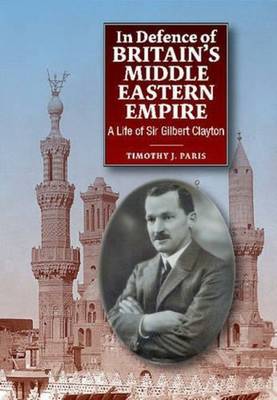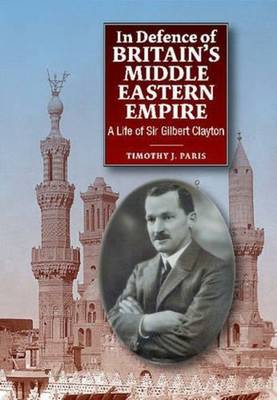
Bedankt voor het vertrouwen het afgelopen jaar! Om jou te bedanken bieden we GRATIS verzending (in België) aan op alles gedurende de hele maand januari.
- Afhalen na 1 uur in een winkel met voorraad
- In januari gratis thuislevering in België
- Ruim aanbod met 7 miljoen producten
Bedankt voor het vertrouwen het afgelopen jaar! Om jou te bedanken bieden we GRATIS verzending (in België) aan op alles gedurende de hele maand januari.
- Afhalen na 1 uur in een winkel met voorraad
- In januari gratis thuislevering in België
- Ruim aanbod met 7 miljoen producten
Zoeken
In Defence of Britain's Middle Eastern Empire
A Life of Sir Gilbert Clayton
Paris
Paperback | Engels
€ 62,95
+ 125 punten
Omschrijving
T. E. Lawrence (of Arabia) described his war-time chief as "the perfect leader", a man who "worked by influence rather than by loud direction. He was like water, or permeating oil, creeping silently and insistently through everything. It was not possible to say where Clayton was and was not, and how much really belonged to him". This is the first biography of General Sir Gilbert Clayton (1875-1929), Britain's pre-eminent "man-on-the-spot" during the formative years of the modern Middle East. Serving as a soldier, administrator and diplomat in ten different Middle Eastern countries during a 33-year Middle Eastern career, Clayton is best known as the Director of British Intelligence in Cairo during the Great War (1914-16), and as the instigator and sponsor of the Arab Revolt against the Turks. Dedicated to the preservation of Britain's Middle Eastern empire, Clayton came to realize that in the transformed post-war world Britain could ill afford to control all aspects of the emerging nation-states in the region. In his work as adviser to the Egyptian government (1919-22), he advocated internal autonomy for the Egyptians, while asserting Britain's vital imperial interests in the country. As chief administrator in Palestine (1923-5), he sought to reconcile the Arabs to Britain's national home policy for the Jews, and, at the same time, to solidify Britain's position as Mandatory power. In Arabia, Clayton negotiated the first post-war treaties with the emerging power of Ibn Saud, (1925, 1927), but curtailed his designs on the British Mandates in Iraq and Transjordan. And, in Iraq, where Clayton served as High Commissioner (1929), he backed Iraq's independence within the framework of the British Empire.
Specificaties
Betrokkenen
- Auteur(s):
- Uitgeverij:
Inhoud
- Aantal bladzijden:
- 576
- Taal:
- Engels
Eigenschappen
- Productcode (EAN):
- 9781845197858
- Verschijningsdatum:
- 1/08/2016
- Uitvoering:
- Paperback
- Formaat:
- Trade paperback (VS)
- Afmetingen:
- 178 mm x 234 mm
- Gewicht:
- 952 g

Alleen bij Standaard Boekhandel
+ 125 punten op je klantenkaart van Standaard Boekhandel
Beoordelingen
We publiceren alleen reviews die voldoen aan de voorwaarden voor reviews. Bekijk onze voorwaarden voor reviews.









